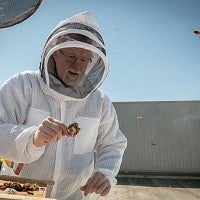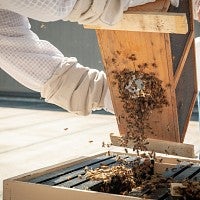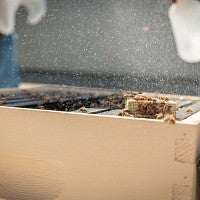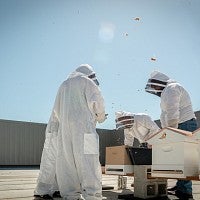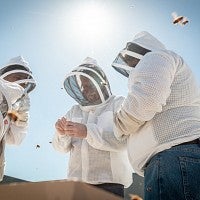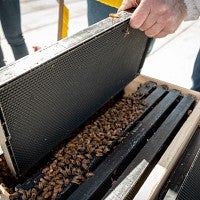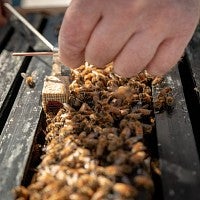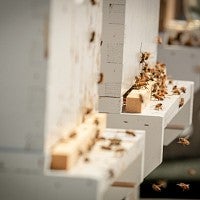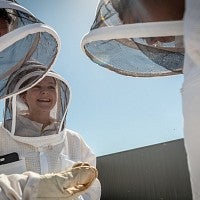The Erb Memorial Union has a reputation as the buzzing social hub at the University of Oregon. That cachet was confirmed in April, when three hives of honey bees settled on the roof of the student wing.
The beehive project comes from students on the UO Bee Friendly Committee with support from the Student Sustainability Center and EMU administration.
“The EMU is a place where students get to experiment and try new things,” said Laurie Woodward, director of the EMU. “This was something that was easy to say yes to.”
Two of the hives were built by EMU maintenance staff and installed in early April. Students built two more hives, one for the EMU rooftop and the other for the Grove Garden, a student-run community garden.
“It’s a great way for students and staff to connect on something that’s important to them all,” Woodward said.
On April 26, four students from the bee committee donned white beekeeping suits to set up the new colony on the EMU. They were joined by David Flock from EMU facilities maintenance, who has been raising his own bees for about 10 years.
Clumps of Italian honey bees, purchased at a discount from GloryBee in Eugene, arrived in a box of wood and screens. Flock said the Italian bees are not as aggressive as some breeds, making them a good choice for beginning beekeepers.
The bees’ mostly mellow temperament was demonstrated when student Bear Heindel, president of the bee committee, transferred them into the hive. The bees gently tumbled out and moved between the inner frames of the hive.
Some bees took flight and explored their new surroundings, but many stayed put, calmed by light mists of water and puffs of smoke from a hand-held smoker.
Within 10 to 15 minutes, Flock pointed out that some of the bees were already signaling they were settling in. Bees raise their stinging end to give off pheromones, he said, which is a bee’s way of announcing, “This is my home.”
In addition to the 3 pounds of bees — about 10,000 in all — the queen was in her own small box. Flock explained that the queen was new to the colony, so it would take a few days for the other bees to accept her.
During this time of adjustment, the end of the queen’s protective box is plugged with a piece of sugar — in this case, a gummy bear. The worker bees would slowly eat the gummy bear, Flock said, eventually opening the hole and releasing the queen into the hive.
The life expectancy of the queen is about three years. To help track their age, they are marked with a different color each year. Appropriately enough for the new UO hives, the color for 2019 queens is green.
The honey bee project is one of several pollinator-positive initiatives that have taken flight thanks to the bee committee.
Debbie Schlenoff, a senior instructor in biology and faculty adviser to the group, said that the students have worked with UO facilities management to add more native flowering plants on campus. They’ve also created mason bee houses and other shelters for native bees, and they are working in the Grove Garden to create a pollinator garden.
“The committee is doing great work to support native bees on campus,” Schlenoff said.
The emphasis on native plants and pollinators is a strategic one.
“There are about 500 species of native bees in Oregon alone,” she said. “Most are solitary bees and rarely sting. And they are far more efficient at pollinating plants, including our food crops, than are honey bees.”
While honey bees cannot replace native pollinators, having hives on the EMU roof adds an avenue for academic collaboration. Schlenoff said that she and others in the biology department envision potential student projects built around the bee activity at the hives.
“I would suggest it as an opportunity for the term project in the animal behavior course that I teach,” Schlenoff said, adding that she hopes to schedule access so her class can visit as a group.
When the EMU bee colonies become established, there will be one more benefit: honey.
Flock said beekeepers never expect honey the first year, but it can happen. “If you get it, it’s a bonus,” he said.
When eventually honey is ready to harvest, Woodward said the EMU will find a way to share it with students.
Woodward added that the information technology staff in the Division of Student Life is exploring ways to set up a “bee cam,” similar to the osprey cam on the William W. Knight Law Center.
—By Colleen Schlonga, Student Services and Enrollment Management



